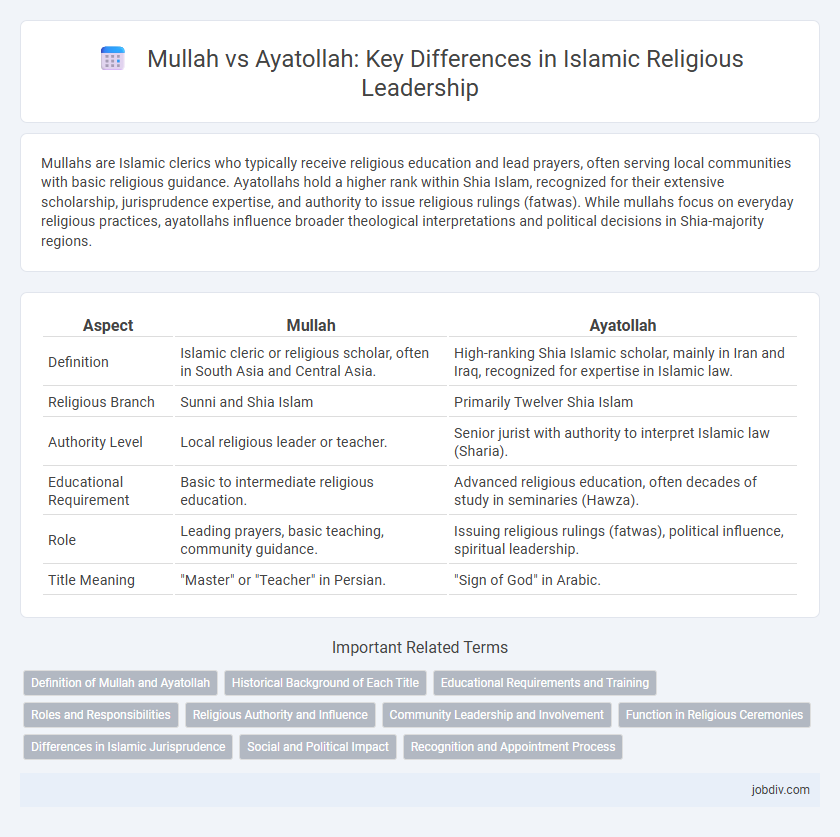Mullahs are Islamic clerics who typically receive religious education and lead prayers, often serving local communities with basic religious guidance. Ayatollahs hold a higher rank within Shia Islam, recognized for their extensive scholarship, jurisprudence expertise, and authority to issue religious rulings (fatwas). While mullahs focus on everyday religious practices, ayatollahs influence broader theological interpretations and political decisions in Shia-majority regions.
Table of Comparison
| Aspect | Mullah | Ayatollah |
|---|---|---|
| Definition | Islamic cleric or religious scholar, often in South Asia and Central Asia. | High-ranking Shia Islamic scholar, mainly in Iran and Iraq, recognized for expertise in Islamic law. |
| Religious Branch | Sunni and Shia Islam | Primarily Twelver Shia Islam |
| Authority Level | Local religious leader or teacher. | Senior jurist with authority to interpret Islamic law (Sharia). |
| Educational Requirement | Basic to intermediate religious education. | Advanced religious education, often decades of study in seminaries (Hawza). |
| Role | Leading prayers, basic teaching, community guidance. | Issuing religious rulings (fatwas), political influence, spiritual leadership. |
| Title Meaning | "Master" or "Teacher" in Persian. | "Sign of God" in Arabic. |
Definition of Mullah and Ayatollah
A mullah is an Islamic cleric or religious scholar trained in Islamic theology and jurisprudence, often serving as a local prayer leader or teacher within the Muslim community. An ayatollah is a high-ranking Shia cleric recognized for exceptional knowledge in Islamic law, ethics, and philosophy, usually granted authority to issue religious rulings called fatwas. The title ayatollah signifies advanced scholarly status beyond that of a mullah, indicating significant influence within Shia Islam.
Historical Background of Each Title
The title "Mullah" originated in Persian and Arabic cultures, historically designating a learned Islamic cleric or teacher primarily in local communities. "Ayatollah" emerged in the 20th century within Shia Islam, signifying a higher rank conferred upon scholars recognized for exceptional knowledge and piety, often involved in legal and theological authority. The distinction between Mullah and Ayatollah reflects evolving religious hierarchies and scholarly achievements within Islamic traditions.
Educational Requirements and Training
Mullahs typically undergo religious education at local seminaries, emphasizing basic Islamic jurisprudence, Quranic studies, and traditional rituals over several years. Ayatollahs complete advanced theological training at prominent seminaries such as Qom or Najaf, often spending decades mastering Islamic law, philosophy, and ethics to achieve high jurisprudential authority. Their rigorous scholarly achievements enable ayatollahs to issue independent legal opinions (fatwas) and guide complex religious and political matters within Shia Islam.
Roles and Responsibilities
Mullahs primarily serve as religious teachers and local spiritual leaders, responsible for conducting prayers, teaching Islamic jurisprudence, and guiding community worshippers. Ayatollahs hold higher religious authority, often issuing fatwas, interpreting Sharia law, and influencing political and social policies within Shia Islam. The hierarchy distinguishes ayatollahs as senior scholars with broader theological expertise and leadership roles compared to mullahs.
Religious Authority and Influence
Mullahs are Islamic clerics who provide religious guidance primarily within local communities, often leading prayers and teaching Islamic law, while Ayatollahs hold higher scholarly rank in Shia Islam, with significant authority on theological interpretations and jurisprudence. Ayatollahs influence religious, political, and social spheres, particularly in countries like Iran, where their rulings shape national policies and ideology. The distinction in religious authority emphasizes the Ayatollah's role as a key interpreter of Sharia and a source of guidance for both followers and government institutions.
Community Leadership and Involvement
Mullahs often serve as local community leaders, providing religious guidance, teaching Islamic jurisprudence, and leading daily prayers in mosques. Ayatollahs hold a higher rank within Shia Islam, exerting significant influence through issuing religious edicts (fatwas) and guiding broader political and social matters affecting communities. Their leadership roles differ in scale, with mullahs focusing on immediate congregational needs and ayatollahs shaping larger ideological and cultural frameworks.
Function in Religious Ceremonies
Mullahs primarily lead daily prayers, deliver sermons, and oversee local religious ceremonies within mosques and community settings. Ayatollahs hold higher religious authority, often issuing fatwas and guiding major religious rituals, as well as influencing theological interpretations and religious education. Their role extends to shaping religious doctrine and providing spiritual leadership in significant Shiite ceremonies like Muharram.
Differences in Islamic Jurisprudence
Mullahs typically serve as community-level religious leaders with foundational knowledge in Islamic jurisprudence, focusing on local religious guidance and teaching. Ayatollahs possess advanced expertise in Usul al-Fiqh (principles of Islamic jurisprudence) and Fiqh (Islamic law), enabling them to issue fatwas and provide high-level interpretations in Shia Islam. The hierarchical distinction reflects the depth of scholarly training and authority in legal and theological matters within the Shia clerical system.
Social and Political Impact
Mullahs, as local Islamic clerics, often engage directly with community issues and grassroots political movements, shaping social norms through religious guidance and education. Ayatollahs, possessing higher scholarly rank and authority in Shia Islam, influence national and international political landscapes by issuing fatwas and guiding state policies, particularly within countries like Iran. The distinction in their roles reflects differing scopes of influence: mullahs impact social cohesion at the local level, while ayatollahs wield substantial political power in shaping governance and ideological direction.
Recognition and Appointment Process
The recognition and appointment process for a mullah typically involves local religious education and community endorsement, whereas an ayatollah is recognized through rigorous scholarly achievement and endorsement by peers within the highest levels of Shia Islamic seminaries. Ayatollahs often receive formal titles through a combination of scholarly publications, fatwas, and acknowledgment by established religious authorities, granting them greater influence and authority. This hierarchical distinction underscores the ayatollah's role in providing religious guidance and jurisprudence at a broader, often national or international level compared to mullahs who primarily serve local congregations.
mullah vs ayatollah Infographic

 jobdiv.com
jobdiv.com